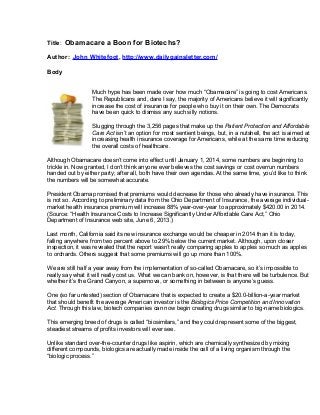
Obamacare a Boon for Biotechs?
- 1. Title: Obamacare a Boon for Biotechs? Author: John Whitefoot, http://www.dailygainsletter.com/ Body Much hype has been made over how much “Obamacare” is going to cost Americans. The Republicans and, dare I say, the majority of Americans believe it will significantly increase the cost of insurance for people who buy it on their own. The Democrats have been quick to dismiss any such silly notions. Slugging through the 3,256 pages that make up the Patient Protection and Affordable Care Act isn’t an option for most sentient beings, but, in a nutshell, the act is aimed at increasing health insurance coverage for Americans, while at the same time reducing the overall costs of healthcare. Although Obamacare doesn’t come into effect until January 1, 2014, some numbers are beginning to trickle in. Now granted, I don’t think anyone ever believes the cost savings or cost overrun numbers handed out by either party; after all, both have their own agendas. At the same time, you’d like to think the numbers will be somewhat accurate. President Obama promised that premiums would decrease for those who already have insurance. This is not so. According to preliminary data from the Ohio Department of Insurance, the average individual- market health insurance premium will increase 88% year-over-year to approximately $420.00 in 2014. (Source: “Health Insurance Costs to Increase Significantly Under Affordable Care Act,” Ohio Department of Insurance web site, June 6, 2013.) Last month, California said its new insurance exchange would be cheaper in 2014 than it is today, falling anywhere from two percent above to 29% below the current market. Although, upon closer inspection, it was revealed that the report wasn’t really comparing apples to apples so much as apples to orchards. Others suggest that some premiums will go up more than 100%. We are still half a year away from the implementation of so-called Obamacare, so it’s impossible to really say what it will really cost us. What we can bank on, however, is that there will be turbulence. But whether it’s the Grand Canyon, a supernova, or something in between is anyone’s guess. One (so far untested) section of Obamacare that is expected to create a $20.0-billion-a-year market that should benefit the average American investor is the Biologics Price Competition and Innovation Act. Through this law, biotech companies can now begin creating drugs similar to big-name biologics. This emerging breed of drugs is called “biosimilars,” and they could represent some of the biggest, steadiest streams of profits investors will ever see. Unlike standard over-the-counter drugs like aspirin, which are chemically synthesized by mixing different compounds, biologics are actually made inside the cell of a living organism through the “biologic process.”
- 2. Biosimilars are basically generic versions of biologics. This is how biotech companies create vaccines, gene therapy drugs, cancer treatments, and so on. Biosimilars have been legal in Europe since 2004, with some companies reporting incredible profits. While controversy continues to rage about the benefits and costs of Obamacare, the general consensus is that the introduction of generic biosimilars at discount prices into the U.S. should be a big plus. Not surprisingly, generic biosimilars are a big bonus for the Obama administration. After all, the government is looking for ways to cut healthcare expenses, and an increase in the use of cheaper, generic biosimilars should help control prescription drug spending and medication costs. Harvard-trained economist Dr. Robert Shapiro estimated that these generic drugs would save American consumers between $236 billion and $378 billion over 20 years for just the top 12 categories of biologic treatments with expired patents. MSN Money reports the market for these generic drugs is expected to soar 8,000% by 2020. (Source: Crowder, A., “Top Stocks 2013: Spectrum Pharmaceuticals,” MSN Money, January 2, 2013, last accessed June 12, 2013.) Unfortunately, this potential boon for smaller biotech companies has yet to materialize, and for many, it’s another example of the Obamacare failure. Though I think we may be too hasty in kicking this particular section of Obamacare to the curb; after all, just because Obamacare is law doesn’t mean the slow-grinding laws of nature have changed. Pharmaceutical research, even if it’s just creating a generic biosimilar, can take time. Just because something hasn’t materialized doesn’t mean it won’t. The fact of the matter is that the Obama administration has opened the door for smaller biotech firms to make cheaper, generic biosimilars. The Obama administration will also be doing everything possible to keep healthcare costs down. One of the best ways to do this is to allow generic biosimilars to hit the market more efficiently. Companies don’t need to reinvent the wheel to make money. For many excellent smaller biotech firms, innovation and stellar profits are generic. Source: http://www.dailygainsletter.com/stock-market/obamacare-a-boon-for-biotechs/1072/ Copyright © 2013 Daily Gains Letter – All Rights Reserved Bio: The Daily Gains Letter provides independent and unbiased research. Our goal at the Daily Gains Letter is to provide our readership with personal wealth guidance, money management and investment strategies to help our readers make more money from their investments.
